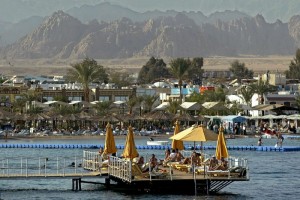
(AFP Photo)
The struggling tourism sector, which employs about 2.83 million Egyptians, has been further stressed following the 30 June protests, as attacks continue inthe SinaiPeninsula since Mohamed Morsi’s ouster on 3 July.
“Alexandria, Luxor and Aswan are the cities which suffer lowest turnout of tourists,” said Mohamed Saleh, a member in the Chamber of Tourism Companies, noting that for the last two years the occupancy in Sharm El-Sheikh’s resorts has been much better than other citiesdespiteprevious Rafah attacks in 2011 and 2012.
In the first days after 30 June, the Sinai saw 39 terrorist attacks, when clashes broke out between armed groups and security forces.
Last Friday a group of unknown armed militants carried out a series of attacks at night in Al-Arish, capital of North Sinai, resulting in the death of two civilians, with an additional three injured, two of whom soldiers.
The influx of tourists was stalled after the 30 June protests, especially in Cairo, Alexandria, Luxor, Sharm El-Sheikh and Aswan, said secretariat of the Chamber of Tourism establishments, Ehab Abdel Aal.
Abdel Aal emphasised that violence and frequent attacks in Sinai hit tourism in Sharm El-Sheikh and the whole region; however tourismin Hurgada city,which is one of the most popular sites in Egypt, so farhas not beenaffected.
“Occupancy rates in Sharm El-Sheikh slid to 20% compared to 50%,” said Abdel Aal.
Both North and South Sinai had been affected by the street upheavals, and were further affectedby the latest attacks in Sinaiand the increasingbloodshed, said deputy head of the hotels chamber, Hani El-Saher.
El-Saher stated that there are above 35% of reservation were cancelled on the eve of June 30 revolution.
Abdel Aal believes that 2014 will be a fruitful year for tourism in Egypt; given that after any three years of a downgrade, there should be a rebound.
“Moreover, tourism officials, news agencies and hotel officials are in talks with their counterparts across many nations abroad to promote Egypt’s tourism and they are organising a number of reservations,” said Abdel Aal.
However, El-Saher does not expect a quick recovery of tourism in 2014, saying:“Egyptcan recover after any decline, but that cannot take place as long as violence is spreading in the streets.”
Speaking to MENA, the president of Egypt’s Union for Tourism Chambers, Elhamy El-Zayat, said: “The tourism sector is no longer working regularly, and it has been suffering a lot over the last three years, which makes it unable to pay loans and workers salaries.”




